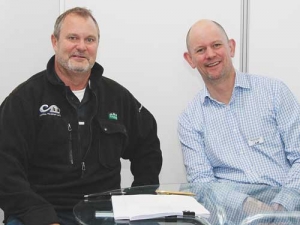LIC lifts half-year revenue on strong demand for dairy genetics
Herd improvement company LIC has posted a 5.2% lift in half-year revenue, thanks to increasing demand for genetics.
 Brendon Cane (Precision Farming), left, and Wayne McNee (LIC) signing the agreement at National Fieldays.
Brendon Cane (Precision Farming), left, and Wayne McNee (LIC) signing the agreement at National Fieldays.
LIC is joining forces with Precision Farming Ltd, supplier of GIS-based systems that manage the application of farm nutrients to optimise pasture growth including fertiliser and effluent.
Precision will share its nutrient management functionality for integration with the co-op’s Minda farm management system used by 90% of dairy farmers.
LIC chief executive Wayne McNee says it would provide enhanced information for farmers about their pasture and feed availability.
“With a predominantly grass-based industry we recognise pasture management and feed optimisation is important.
“Seamless integration of farm information like fertiliser, effluent, water and irrigation will complement our existing pasture management tools in Minda.”
Precision Farming’s system records spreading and nutrient activity on 4500 farms, based on data generated by 720 of the country’s estimated 800 commercial fertiliser spreading trucks.
Precision Farming also markets fertiliser monitoring GPS equipment direct to farmers, for use on self-spreading equipment and for GPS guidance and control of tractors, sprayers and harvesters.
Brendon Cane, managing director of Precision Farming, says the partnership will make it easier, faster and more profitable for more farmers to use integrated farm management information to support better decisions.
As a contractor himself, he appreciates the benefits of reducing the time and cost, and often the guesswork, in improving pasture performance as part of overall farm profitability. “With the current economic environment, finding any inefficiencies in operating expenses is more important than ever.”
Dairy Women's Network (DWN) has announced that Taranaki dairy farmer Nicola Bryant will join its Trust Board as an Associate Trustee.
Rural Women New Zealand (RWNZ) says it welcomes the release of a new report into pay equity.
Red meat exports to key quota markets enjoyed $1.4 billion in tariff savings in the 2024-25 financial year.
Remediation NZ (RNZ) has been fined more than $71,000 for discharging offensive odours described by neighbours as smelling like ‘faecal and pig effluent’ from its compositing site near Uruti in North Taranaki.
Two kiwifruit orchards in the Bay of Plenty and one in Northland are this year's finalists for the Ahuwhenua Trophy competition.
OPINION: Staying with politics, with less than nine months to go before the general elections, there’s confusion in the Labour…
OPINION: Winston Peters' tirade against the free trade deal stitched with India may not be all political posturing by the…